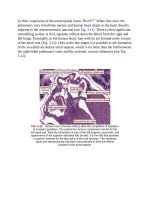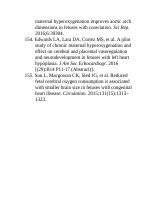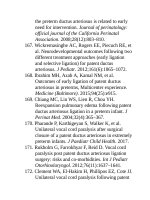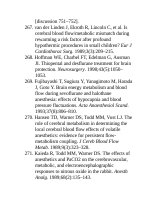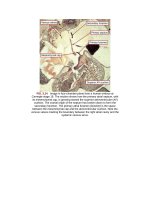Andersons pediatric cardiology 1896
Bạn đang xem bản rút gọn của tài liệu. Xem và tải ngay bản đầy đủ của tài liệu tại đây (130 KB, 3 trang )
FIG.72.5 Interstageeventsbyshunttypeinconsecutivepatientsenrolled
inthelocalhomemonitoringprogramforinterstagecareafterstageI
palliation.(FromRuddNA,FrommeltMA,TweddellJS,etal.Improving
interstagesurvivalafterNorwoodoperation:outcomesfrom10yearsof
homemonitoring.JThoracCardiovascSurg.2014;148[4]:1540–1547.)
FIG.72.6 Interstagemanagementforhomemonitoredpatientswith
outpatientevents.EventsaredefinedasSpO2<75%or>90%,weightloss
of30g,orfailuretogain30gin3days.(FromRuddNA,FrommeltMA,
TweddellJS,etal.ImprovinginterstagesurvivalafterNorwoodoperation:
outcomesfrom10yearsofhomemonitoring.JThoracCardiovascSurg.
2014;148[4]:1540–1547.)
NutritionalManagement
Historically,growthfailureduringtheinterstageperiodwascommon,but,with
theintroductionofweightandenteralintaketrackingaspartofinterstage
surveillanceprograms,thenutritionallyat-riskstageIpalliationinfanthas
showntheabilitytogainweightatratesnearorequaltohealthypeers.9,10A
minimumofweeklyreassessmentofweighttrends,volumeandcaloricintake,
andgrowthvelocityisrecommendedduringtheinterstageperiod.Theabilityto
modifynutritionplansbeforegrowthfailureoccursrequiresdiligencein
optimizingcaloricintaketoachievedesiredweightgainbytheinfantwithout
causingvolumeoverloadorfeedingintolerance.Duetothemetabolicdemands
ofstageIpalliationphysiology,mostinfantswillrequireaminimumof100
mL/kgperdayforadequatehydrationandbetween100and130cal/kgperday
todemonstrateconsistentweightgain.Guidancefromaclinicaldietician
familiarwiththephysiologicdemandsofstageIpalliationinfantscanbe
invaluableinmanagingenteralfeedsandoptimizingnutritionaloutcomesduring
theinterstageperiod.
Managementoffailuretothrivemayincludeoutpatientmodificationofthe
enteralnutritionplan,outpatientclinicevaluationforcardiacreevaluation,or
inpatientadmissiontoassessforpotentialcausativeconditionssuchasinfection,
cardiacpathology,orgastrointestinaldisease.Interventionsmayinclude
increasingfeedvolumesiftubesupplementationinplaceorincreasingcaloric
densityofformulaorexpressedbreastmilkifinfantfeedingexclusivelyby
bottle.Fortheinfantbeingfedevery3hours,increasingbolusvolumeby5or
40mLforthedaywilltypicallyresultinincreasedweightgainafter1to2days
oftheincrease.Ifcaloricdensityisadjusted,itisrecommendedtoincreasebya
maximumor2to3caloriesperouncetoamaximumof30caloriesperounce.46
Withchangeincaloricdensityofformulaorexpressedbreastmilk,itisvitalto
consultwithaclinicaldieticianandreputableresourcesforfortificationrecipes
andmixinginstructions.Errorsinformulapreparationcanleadtometabolicand
gastrointestinaldisturbances.
Progressivecirculatoryinsufficiencyduringtheinterstageperiodmayresultin
adeclineinoralintakeorintoleranceofenteraltubefeeds.Iftheexclusively
orallyfedinfantstrugglestomeetgoalvolumesforhydrationandgrowth,
feedingsupplementationviatubemaybeindicated.Ifplacementofanasogastric
tubeforsupplementationisplanned,itishighlyrecommendedthatinitial
placementbeperformedinasettingabletomanageanypotentialcomplications
oftubeplacementshouldcardiorespiratorydecompensationwithtubeinsertion.
Outpatienttherapytooptimizeoral-motorskillsshouldbeinplaceduringthe
interstageperiod.Infantswhofailtogrowdespitefocusednutritional
managementrequiremedicalevaluationofthecardiovascularstatusandthe
potentialneedforearlycardiacintervention.
High-RiskClinic/Follow-Up
Evolutionofinterstagehomemonitoringprogramshasresultedinthe
developmentofadditionaloutpatientstrategiestoenhancethesurveillance
betweenstagesIandIIpalliation,specificallyweeklycommunicationwith
familiesanddedicatedhigh-riskclinics.Weeklycommunicationbetweenparents
andtheinterstagecareteamprovidesopportunitytoreviewcallcriteriaorredflagconcerns,reviewweightandvitalsigntrends,discussnutritional
management,assessforfamilystress,reinforceeducation,provideanticipatory
guidance,andobtainageneralimpressionoftheinfant'sclinicalstatuswhile
providingregularfamilysupport.Weeklycontactcanbemadeviatelephone,
email,ortextmessaging.Suchcommunicationcanbebeneficialindetecting
